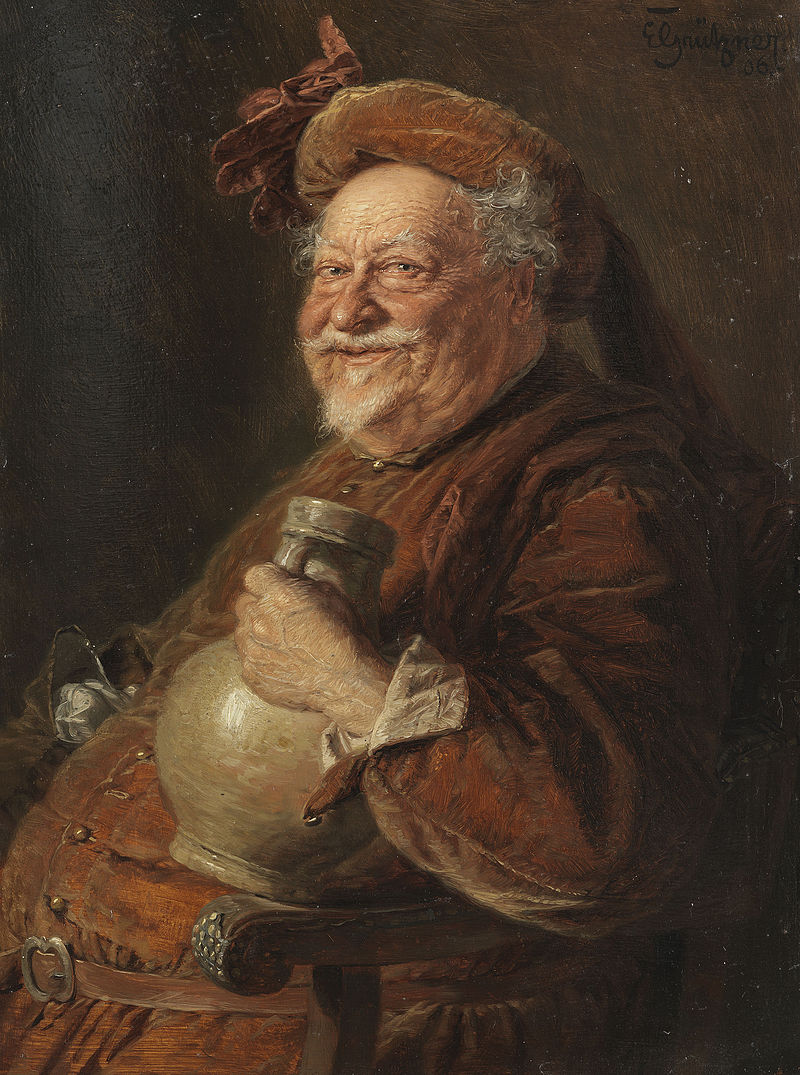During these cold dark days of winter, with ice and sleet in the forecast and Spring more than a month away, we could all use some cheering up. For Ishmael, in the opening paragraph of Moby Dick, that meant it was “high time to get to sea as soon as I can.” For me, it means it’s high time to turn to some cheerful words of wisdom from Falstaff.
I’ve written before of my love of Falstaff. I am, of course, hardly alone. In the words of the great literary critic Harold Bloom, who died last fall at the age of 89, Falstaff is not just “the glory of the Henry IV plays” but (Bloom’s italics) “the grandest personality in all of Shakespeare.” Here are three of my favorite Falstaff speeches. I hope you enjoy them.
- In a wonderfully comic scene in Henry IV. Part 1, Falstaff plays dead to avoid being killed in battle. Danger having passed, the fat knight rises from his feigned death. Was it an act of cowardice to fake your own death? Of course not, he claims. Don’t be ridiculous. As he explains, abstractions like “honor” and “valor” will get you nothing once you’re dead. Falstaff claims that his conduct is precisely the kind of “discretion” that keeps a man from foolishly running into swords in an effort to earn a reputation for heroism:
To die is to be a counterfeit, for he is but the counterfeit of
a man who hath not the life of a man; but to counterfeit dying,
when a man thereby liveth, is to be no counterfeit, but the true
and perfect image of life indeed. The better part of valor is
discretion, in the which better part I have saved my life.
Henry IV, Part 1, Act 5, Scene 4
- Another favorite speech on honor occurs as talk of war escalates in that same play. Falstaff asks Hal to stand over him if he should fall in battle. Hal tells him absolutely not, and, as he exits the stage, invokes a code of honor, telling Falstaff he owes God a death. Falstaff, alone on the stage, provides us with a powerful soliloquy on honor, beginning with whether he does owe God his death:
It’s not due yet. I’d hate to pay him before the due date. Why should I be so eager to pay him before he even asks for it? Well, it doesn’t matter: honor spurs me on. Yeah, but what if honor spurs me off once I’m on, and picks me out to die? What happens then? Can honor set a broken leg? No. Or an arm? No. Can it make a wound stop hurting? No. Honor can’t perform surgery, then? No. What is honor? A word. What is in that word, “honor?” What is that “honor?” Air. Quite a bargain! Who has it? A guy who died last Wednesday. Does he feel it? No. Does he hear it? No. It can’t be detected, then? Right—not by the dead, anyway. But won’t it live with the living? No. Why? Slander won’t allow it. That’s why I don’t want any part of it. Honor is nothing more than a gravestone, and that concludes my catechism.
Henry IV, Part 1, Act 5, Scene 1
- Finally, one of Falstaff’s most poignant speeches comes, unexpectedly, in the middle of a comic scene in a tavern where he plays the part of King Henry IV (Hal’s father) to help Hal prepare for his upcoming meeting with his father. He questions Hal about his companions and in particular about Falstaff. As the King, of course, Falstaff speaks most kindly of Falstaff. They then reverse roles, with Hal playing the King and Falstaff playing Prince Hal. Looking on are the hostess, Mistress Quickly, and Hal’s companions Bardolph and Peto. Now playing the role of the King, Hal excoriates the Prince for hanging out with that “villanous abominable misleader of youth, Falstaff, that old white-bearded Satan.” “My Lord, I know the man,” replies the “Prince.” Then banish him, the “King” says. And here is Falstaff’s response (in the role of Prince Hal):
But to say I know more harm in him than in myself, were to say more than I know. That he is old, the more the pity, his white hairs do witness it; but that he is, saving your reverence, a whoremaster, that I utterly deny. If sack and sugar be a fault, God help the wicked! if to be old and merry be a sin, then many an old host that I know is damned: if to be fat be to be hated, then Pharaoh’s lean kine are to be loved. No, my good lord; banish Peto, banish Bardolph, banish Poins: but for sweet Jack Falstaff, kind Jack Falstaff, true Jack Falstaff, valiant Jack Falstaff, and therefore more valiant, being, as he is, old Jack Falstaff, banish not him thy Harry’s company: banish plump Jack, and banish all the world.
Henry !v, Part 1, Act 2, Scene 4
For more on what makes Falstaff so appealing and memorable, I recommend Theodore Dalrymple’s essay in City Journal entitled “Why We Love Falstaff.“

I loved all it all Mike. Thanks for posting this. I now know who Falstaff is, other than a beer once made in St. Louis, and where the saying “the better part of valor is descresion” comes from. I have used that phrase for years in lessons for my sons when dealing with their mother.
I agree, John.
Thank you for this.